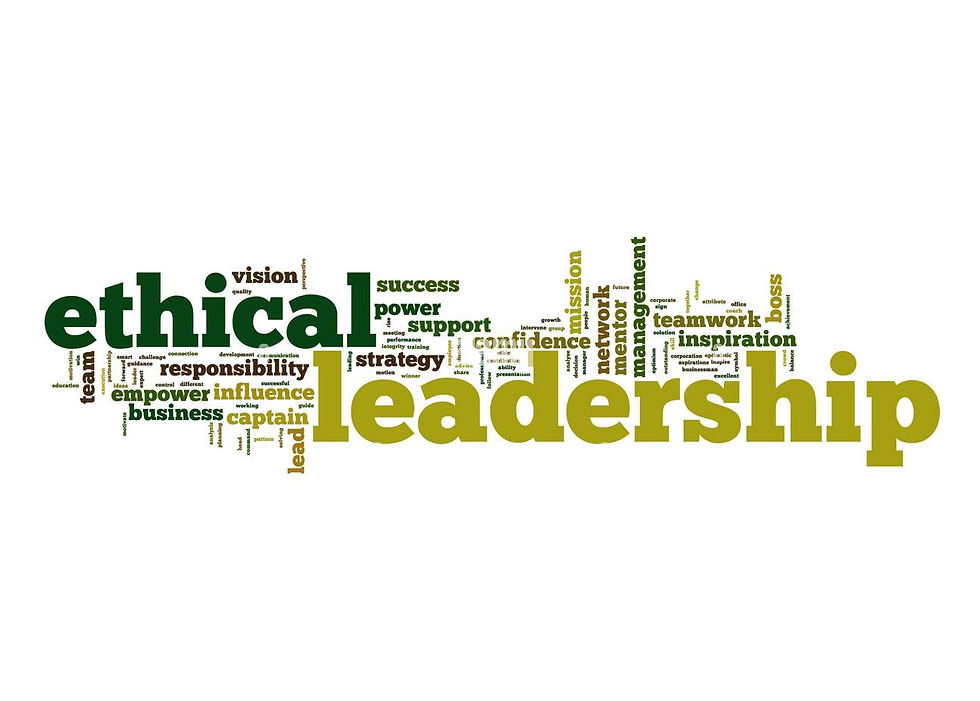Ethics and Leadership
- Haison Piggangay
- Feb 11, 2023
- 3 min read
Updated: Feb 15, 2023

"Ethics is knowing the difference between what you have a right to do and what is right to do." [1]
- Potter Stewart
"Leadership is not just about command and control, but about empowering and inspiring."
- Jack Ma
Ethics and leadership are two critical components of modern policing that help to ensure that the police are effective and accountable in serving the community. Both ethics and leadership help to shape the behavior of police officers and influence their decision-making, and they are essential for building trust and legitimacy in the eyes of the public.[2]
In recent years, there has been increasing scrutiny of police conduct, and the importance of ethical behavior and leadership in policing has become even more pronounced. Police officers are held to a high standard of ethical behavior, and leaders must set an example for the officers they lead. This requires a strong commitment to integrity and the values of the police profession.
One key aspect of ethical behavior in policing is the principle of impartiality. Police officers must enforce the law fairly and without bias, regardless of a person's race, ethnicity, or any other characteristic. Leaders must also ensure that their officers are held to this standard and that the policies and procedures of the police department reflect this commitment.
Leadership in modern policing requires a strong commitment to continuous improvement. Police leaders must be open to new ideas and willing to embrace change, especially in the face of new challenges. They must also be able to inspire and motivate their officers to achieve their full potential and to continuously strive for excellence in their work. Transparency and accountability are also critical components of modern policing. Police leaders must be transparent in their decision-making and willing to take responsibility for their actions. They must also ensure that their officers are held accountable for their behavior and that there are mechanisms to investigate and address any misconduct.
Effective communication is another important aspect of modern policing. Leaders must communicate effectively with their officers, the community, and other stakeholders. They must be able to articulate the goals and priorities of the police department and communicate their vision in a way that inspires and motivates others. Inclusiveness is another key characteristic of modern policing. Police leaders must be inclusive and welcoming to diverse perspectives and experiences. They must also ensure that their officers are trained in cultural competence and can work effectively with people from diverse backgrounds.
Empowerment is also a critical component of modern policing. Police leaders must empower their officers to make decisions, solve problems, and take the initiative. This can lead to more innovative and effective solutions and improved morale and job satisfaction among officers.
Finally, ethical and effective leadership in modern policing requires a strong commitment to personal and professional development. Leaders must be willing to learn and grow and invest in their officers' development. This can include providing training, mentorship, and professional development opportunities and encouraging officers to engage in continuing education and professional development opportunities.
In conclusion, ethics and leadership are essential components of modern policing. They help to ensure that the police are effective and accountable in serving the community, and they are critical for building trust and legitimacy in the eyes of the public. By committing to ethical behavior, continuous improvement, transparency and accountability, effective communication, inclusiveness, empowerment, and personal and professional development, police leaders can help to create a culture of excellence within their departments and help to improve policing outcomes.
Reference:
Sosito (2022). Leadership experience seminar. Enhanced Leadership Program (ELP). PNPA.
[1] Ethical Issues in Law Enforcement - Palo Alto University. https://concept.paloaltou.edu/resources/business-of-practice-blog/ethical-issues-in-law-enforcement
[2] Ethics and Integrity in Private Organizations | Nikhilesh Mishra. https://www.nikhileshmishra.com/2023/01/ethics-and-integrity-in-private-organizations.html





Comments